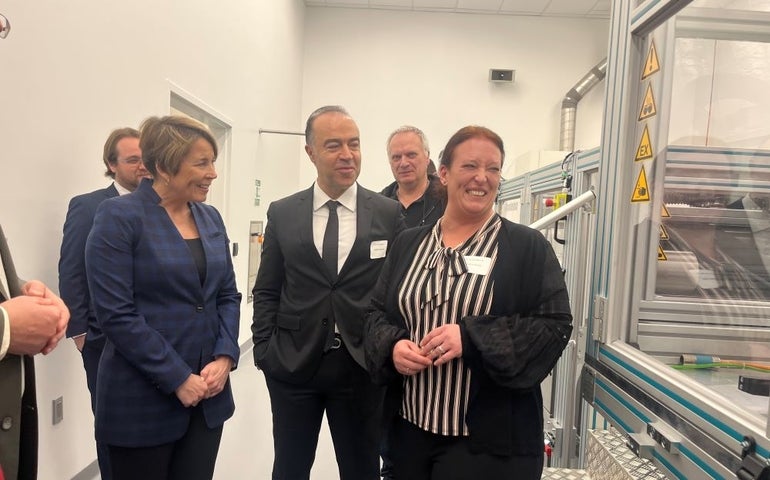Massachusetts state agencies have coordinated with five other Northeast states to create a public-private partnership to attract federal dollars to build a clean hydrogen hub in the region.
The Massachusetts Clean Energy Center and Massachusetts Department of Energy Resources are working with the New York State Energy Research and Development Authority, as well as agencies in Connecticut, New Jersey, Rhode Island and Maine to compete for $8 billion in hydrogen hub funding from the U.S. Department of Energy. Announcement of the awards is anticipated in September or October.
Massport also signed on to the memorandum of understanding to apply for the funds, to make the Northeast one of four regional clean hydrogen hubs designated by the federal government and funded through the Infrastructure Investment and Jobs Act.
Gov. Maura Healey pledged last month that no one will “compete harder as your governor than me” when it comes to abundant federal dollars available right now.
At a Monday visit to Advent Technologies in Charlestown — the new global headquarters for a fuel cell and hydrogen technology company that signed onto the hydrogen hub memorandum — Healey touted “human and intellectual capital” as one of Massachusetts’ primary economic drivers.
“I really want Massachusetts to succeed and to lean into our knowledge-based economy,” she said.
Healey said she wants to be “the most aggressive governor in the country” when it comes to clean energy and climate solutions. She sees the development of clean energy as a step toward addressing climate change and meeting the state’s climate goals, as well as a workforce driver at a time when labor shortages are affecting a large swath of industries.
The regional partnership’s application to build new clean technology is also set on a backdrop of this winter’s unusually high natural gas prices. The Northeast already has limited access to the fossil fuel energy source, typically driving home heating prices up in the region compared to the rest of the country, and unprecedented circumstances this winter hit families especially hard.
Meanwhile, there’s little political appetite from Democrats in charge to expand natural gas access, as the state is legally bound to a target of achieving net-zero emissions by 2050.
In her proposed budget for fiscal year 2024 and a supplemental budget bill, Healey called for tripling state investments to MassCEC, she said. She also dedicated 1 percent of her $54.3 billion plan (excluding the projected $1 billion in new surtax funds earmarked for education and transportation) to the Executive Office of Energy and Environmental Affairs.
“In Massachusetts we are home to tremendous human and intellectual capital, research innovation and know-how, and as governor, I’m looking to support that in all ways and support our companies that are incubating here, our researchers who are working with commercial investors to create technologies and help build an economy that really thrives,” Healey said.
Among other tech products the governor saw on her tour of the Advent facility was a generator that uses methyl alcohol to create power. The company boasts that the fuel cell unit is up to 10 times more efficient than thermoelectric generators and five times more efficient than internal combustion engine generators.
Advent bases its designs on military standards, and says the methanol generator can be quickly transported and deployed wherever necessary. The company also claims that the technology would work well in civilian life where it could be paired with solar panels to continue to provide power during low-sunlight northern winters or bad weather.
“I think the whole use of cells, whether they’re cells that will be used to support telecom operations and soldiers in the field, or vehicles, it’s amazing the potential applications of this technology and, again, really delighted that they have decided to be here in Boston,” Healey said.
The hydrogen hub partnership is not the only regional technology initiative Healey’s administration has set its sights on.
The governor announced in March that the Northeast Microelectronics Coalition, through the support of her administration and MassTech Collaborative, submitted a proposal to the federal government to turn the region into a hub for microtechnology development. This coalition is focused on obtaining federal Department of Defense funding from the recently passed CHIPS Act to build a domestic semiconductor and microelectronics industry in the Northeast.
For the hydrogen power initiative, in addition to Massachusetts state agencies and NYSERDA, more than 60 “clean hydrogen ecosystem partners” have also signed on to compete for funds together — 14 private sector companies, 12 utilities, 20 hydrogen technology original equipment manufacturers, 10 universities, seven nonprofits, two transportation companies and the five other states.

